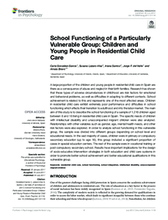Displaying 81 - 90 of 114
This study analyzes the opinions of foster families and social workers regarding the benefits and problems associated with contact visits.
In this paper, the authors examine the reunification patterns of children left‐behind by parents who migrated to France and Spain in order to understand whether children from standard two‐parent families differ in their chances of joining their migrant parents in the destination country compared to children in non‐standard families (single parent and blended families), as well as the potential role of immigration policies on these chances.
The quantitative study presented here contributes knowledge regarding the attitude of professionals towards positive parenting and child participation in professional support of families that are under temporary protection, with the goal of reunification.
This quantitative study contributes knowledge regarding the attitude of professionals towards positive parenting and child participation.
This study aims to give voice to parents and gather their views about contact visits in foster care.
The 2017 country factsheets provide an update on the status of child protection and care reforms from 16 European countries that are the focus of Opening Doors for Europe’s Children campaign in Phase II.
This article examines whether migrant children are viewed differently than native children, employing an experiment on a representative sample of the populations of Austria, Norway and Spain.
This report analyzes the relationship between poly-victimization and the internalizing and externalizing symptoms amongst 12-17 year old youth living in residential care centers in Spain.
This study investigated how adoptive and prospective adoptive parents in Spain deal with signs of fraud and corruption within the intercountry adoption process, illuminating the dismissal of the systemic failures of intercountry adoption and the rights of birth families.
This study describes the school functioning of a sample of 1,216 children aged between 8 and 18 living in residential child care in Spain. Results have important implications for the design of socio-educative intervention strategies in both education and child care systems in order to promote better school achievement and better educational qualifications in this vulnerable group.

